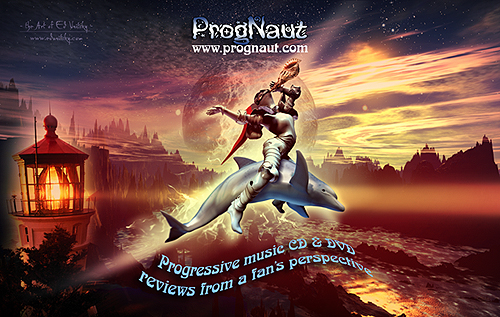To anyone who truly believes the progressive rock genre is on the decline then I suggest you direct your attention to the nation of Poland where a full blown prog/rock renaissance is in full swing. Promo CDs of new Polish artists are emerging with amazing regularity. And audience response to international neo-progressive rock artists filmed at the Wyspianski Theater in Katowice, Poland show a level of enthusiasm that's usually reserved for major pop idols here in the States.
As a staff writer for Prognaut I've had the opportunity to review the bands Retrospective, Quidam, Osada Vida, Love De Vice, and now Believe, which are all quite different from one another; suggesting there is no generic stereotypical sound associated with 'Polish' progressive scene.
I've yet to be disappointed by the music that has come my way.
Other outstanding Polish bands making their mark on the genre include Collage, Satellite, Riverside, Mr. Gil, Millennium, and Albion to name a few. Many of which have several albums under their belt.
Three of the aforementioned bands have one thing in common - guitarist Mirek Gil.
Mirek Gil has performed with the legendary bands Collage (“Safe”, “Basine”, “Moonshine”, “Changes”, “Nine Songs Of John Lennon”), Satellite (“Street Between Sunrise And Sunset”), and four solo albums recorded under the moniker Mr. Gil (“I Want To Get Back Home”, “Alone”, “Skellig”, and “Light And Sound”).
As the guitarist of Believe his discography expands with the 2013 release of the group's fifth album, “The Warmest Sun In Winter”. Previous albums include “World Is Round”, “This Bread Is Mine”, “Hope To See You Another Day” and “Yesterday Is A Friend”.
The complete Believe line-up includes Mirek Gil (guitars), Karol Wroblewski (vocals), Konrad Wantrych (keyboards, backing vocals), Przemas Zawadzki (bass guitar), and Vlodi Tafel (drums).
As a reviewer and fan of the genre I tend to get caught up in that whole “what is and 'isn't” prog controversy – and occasionally find myself scouring for trace evidence of prog/rock residue to justify my enjoyment of music outside the genre. It's easy to get so caught up in semantics and genre categorization that you forget what's really important … songwriting.
Remember songwriting … Bob Dylan, Carole King, Lennon and McCartney, Burt Bacharach, Irving Berlin, and George Gershwin. Legendary songwriters in their field – not because of their field – but because of their music – their songs.
Now I'm not implying the members of Believe are a legend in the making – but what I am suggesting is these guys are an amazing group of songwriters, and “The Warmest Sun In Winter” is a beautiful collection of accessible tunes which should appeal to not only progressive fans and the middle-age mainstream adult contemporary market, but can strike a positive chord in the young listener with an ear for catchy hook laden melodies.
Right or wrong - progressive rock music has been labeled a genre of pretentious excesses; with overly long songs, extended solos, drum kits and keyboard gear which encompasses half a stage, and obscure lyrics which no English major,
psychoanalyst, or Cryptologist could possibly decipher. Occasionally these extended tracks are cobbled together like an over-engineered Rube Goldberg apparatus: a harmonic convergence of incomplete ideas, abrupt tempo changes, piecemeal snippets of concrete sounds, while squeezing as many notes as humanly possible into a measure of music. Lost among the hoopla and razzle dazzle is the absence of a melody.
Have no fear. “The Warmest Sun In Winter” is all about melody and structure.
Like so many albums which have come my way recently “The Warmest Sun In Winter” is a concept album. But this is no convoluted Grimm’s fairly tale set to music – the concept is as plausible and down-to-earth as the music on the album.
Lyricist Karol Wroblewski describes the premise of the concept: “Believe's new album tells the story of a chance meeting of two friends who used to spend a lot of time together in their childhood. Since then, everything has changed … one of the friends has lost his home. And now they sit together and talk about everything that happened in their life. All memories from the past are still alive. The album “The Warmest Sun In Winter” will tell the story of how much sun a man can bring into someone else's life, despite various troubles in life.”
In short – it's a tale of friendship and the healing power of love and understanding. Not too difficult a concept to comprehend.
Karol Wroblewski vocals seem to alternate between John Wetton, Steve Hogarth, Steve Walsh of Kansas, x-Saga front man Michael Sadler, and Roye Albrighton of Nektar. Not a bad combination.
The track “Heartless Land” sounds like a Nektar track recorded during the “Back To The Future” sessions. While the track “Words” starts out like one of those soulful 80s' ballads from Daryl Hall and John Oates with a hint of Nektar in the mix. “Please Go Home” should win over fans with an affinity for Hogarth-era Marillion.
Believe does not overindulge in musical excess or instrumental pyrotechnics. The music is concise, powerful, and emotional without being complex or over-produced. Solos are at a minimum.
My only negative comment isn't about the actual music on the album but the 'hidden track' novelty which I feel has outworn its welcome. I've never understood the logic of making a listener sit through several minutes of dead air to get to a hidden track. And unfortunately “The Bright Day”, which is a great song – but a dreaded 'hidden track ', is an excellent tune I'll never listen to when driving in my car because I have no desire to listen to several minutes of dead air.
“The Warmest Sun In Winter” is highly recommended to fans of Marillion, Nektar, Asia, Saga, Kansas, Airbag, Pink Floyd, RPWL, and Quidam.
Buy it!
Reviewed by Jsoeph Shingler on April 26th, 2013

